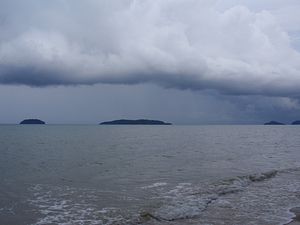On Monday, South Korean Foreign Minister Yun Byung-se met Vietnamese Prime Minister Nguyen Xuan Phuc in Hanoi. The Vietnamese premier sought Yun’s support on the country’s position on the South China Sea disputes, where Vietnam is a claimant in both the Paracel and the Spratly group. Yun’s trip to Vietnam came shortly after he met U.S. Secretary of State Rex Tillerson during his visit to Seoul last week. This year marks the 25th anniversary of bilateral ties between South Korea and Vietnam.
“The Prime Minister proposed that South Korea continue its support over the position of Vietnam and Southeast Asia on the South China Sea issue and to help the country improve its law enforcement at the sea,” the government of Vietnam said in a statement posted online after the meeting between the two. Neither the Vietnamese statement nor any public statement by Yun during his trip indicated direct South Korean support for Vietnam’s claim in the South China Sea.
Yun additionally discussed the North Korean threat with his counterpart Pham Binh Minh, who is also Vietnam’s deputy prime minister. North Korea most recently tested a high-performance rocket engine that experts believes may be used for the first stage of an intercontinental ballistic missile or a satellite launch vehicle. Earlier this month, North Korea fired a salvo of four extended-range Scud missiles into the Sea of Japan.
In addition to strategic issues surrounding the South China Sea dispute and the North Korean ballistic missile and nuclear threats, Yun’s visit focused heavily on the economic aspect of the Vietnam-South Korea relationship. “Last year, Vietnam emerged as South Korea’s fourth-biggest trading partner, with bilateral trade volume surpassing US$4.5 million,” Yun said, according to South Korea’s Yonhap news agency. Yun set a goal to bring the bilateral trading volume between the two countries to $7 million by 2020.
Despite Vietnam’s exhortations, South Korea is unlikely to drastically speak up on the South China Sea issues. After maintaining a low profile on the issue of years, Seoul last year noted the ruling of an arbitral tribunal at the Permanent Court of Arbitration in the Hague in the Philippines’ case against China, which invalidated China’s nine-dash line claim, among other findings. The South Korean Foreign Ministry added that “freedom of navigation and overflight should be safeguarded in the South China Sea” in a statement after the ruling.
Bilateral ties between China and South Korea declined drastically after a decision by the U.S.-South Korea alliance last summer to deploy a Terminal High-Altitude Area Defense (THAAD) battery. China has protested the deployment, saying it impinges on its national interests. In response to the THAAD deployment, Beijing has implicitly retaliated against South Korean business interests in China and taken measures to limit bilateral interactions between the two countries. Any South Korean moves in the South China Sea would intensify the deterioration of this bilateral relationship.
Moreover, after a constitutional court upheld last December’s vote by the South Korean National Assembly to impeach President Park Geun-hye, South Korea is in the midst of a political transition ahead of an election scheduled for May 9. Hwang Kyo-ahn, the acting president, has not made any major declarations on foreign policy in the meantime.

































